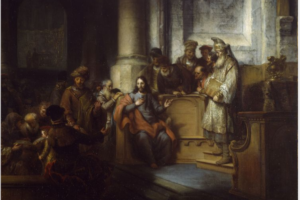Last edited on 23/Jan/2021
The Bible’s Answer
Introduction
The angel of the Lord appears multiple times in the Old Testament, and is mentioned 63 times. He first appeared after Abram’s wife Sarai had sinned against her servant, Hagar, causing her to flee, to tell her to return to Sarai and that she will bear a son called Ishmael, who will be the father of a great nation, because the Lord had listened to her affliction (Genesis 16:7–13). The angel of the Lord appeared to Abraham to command him to not sacrifice his son Isaac, because God was only testing his faithfulness, to see if he was willing to withhold his only son from him or not (Genesis 22:1–2, 9–12). The angel of the Lord appeared to Moses in a burning bush to anoint him as his prophet who would lead the Hebrews out of Egypt, where they were enslaved (Exodus 3:1–6). The angel of the Lord appeared to the Israelites in Bochim to tell Israel about their coming punishment for breaking their covenant with God (Judges 2:1–3).
The angel of the Lord appeared to Gideon to announce that God had chosen him to be his instrument for saving Israel from Midian (Judges 6:11–24). The angel of the Lord also appeared to Manoah and his barren wife, to announce that she would bear and conceive Sampson, who would save Israel from the Philistines (Judges 13:2–5). There are many other occasions where he appears to announce important prophesies and commandments to people, to guide, aid, and protect people, or to execute judgement. So is the angel of the Lord just a messenger of God, a created heavenly being who serves God, or something more? Let’s examine each of these texts that were just mentioned to see who the angel of the Lord is.
The Angel of the Lord Is God
The Appearance of the Angel of the Lord to Hagar
The angel of the LORD found her by a spring of water in the wilderness, the spring on the way to Shur. 8 And he said, “Hagar, servant of Sarai, where have you come from and where are you going?” She said, “I am fleeing from my mistress Sarai.” 9 The angel of the LORD said to her, “Return to your mistress and submit to her.” 10 The angel of the LORD also said to her, “I will surely multiply your offspring so that they cannot be numbered for multitude.” 11 And the angel of the LORD said to her, “Behold, you are pregnant and shall bear a son. You shall call his name Ishmael, because the LORD has listened to your affliction. 12 He shall be a wild donkey of a man, his hand against everyone and everyone’s hand against him, and he shall dwell over against all his kinsmen.” 13 So she called the name of the LORD who spoke to her, “You are a God of seeing”, for she said, “Truly here I have seen him who looks after me.” (Genesis 16:7–12)
The key verse in this passage is verse 13, where it says that Hagar gave a name to “the LORD” himself “who spoke to her”, and not just an angel. Furthermore, she called the angel of the Lord “a God of seeing” and made the statement that she had “seen him who looks after” her, that is, the Lord. These passages very clearly identify the angel of the Lord as God, and state that she had seen and spoken with God.
The Appearance of the Angel of the Lord to Abraham
After these things God tested Abraham and said to him, “Abraham!” And he said, “Here am I.” 2 He said, “Take your son, your only son Isaac, whom you love, and go to the land of Moriah, and offer him there as a burnt offering on one of the mountains of which I shall tell you.” … When they came to the place of which God had told him, Abraham built the altar there and laid the wood in order and bound Isaac his son and laid him on the altar, on top of the wood. 10 Then Abraham reached out his hand and took the knife to slaughter his son. 11 But the angel of the LORD called to him from heaven and said, “Abraham, Abraham!” And he said, “Here am I.” 12 He said, “Do not lay your hand on the boy or do anything to him, for now I know that you fear God, seeing you have not withheld your son, your only son, from me.” (Genesis 22:1–2, 9–12)
The key verse here is verse 12. Here the angel of the Lord said that Abraham did not withhold his only son from him. We are told at the beginning of the passage that Abraham was tested as to whether or not he would withhold his son from God. This again identifies him as God.
The Appearance of the Angel of the Lord to Moses
Now Moses was keeping the flock of his father-in-law, Jethro, the priest of Midian, and he led his flock to the west side of the wilderness and came to Horeb, the mountain of God. 2 And the angel of the LORD appeared to him in a flame of fire out of the midst of a bush. He looked, and behold, the bush was burning, yet it was not consumed. 3 And Moses said, “I will turn aside to see this great sight, why the bush is not burned.” 4 When the LORD saw that he turned aside to see, God called to him out of the bush, “Moses, Moses!” And he said, “Here I am.” 5 Then he said, “Do not come near; take your sandals off your feet, for the place on which you are standing is holy ground.” 6 And he said, “I am the God of your father, the God of Abraham, the God of Isaac, and the God of Jacob.” And Moses hid his face, for he was afraid to look at God. (Exodus 3:1–6)
Here, it is said that the angel of the Lord appeared to Moses in a flame of fire in a bush, and that he called out to Moses “I am the God of your father, the God of Abraham, the God of Isaac, and the God of Jacob”. Thus the angel of the Lord claimed to be God. It also says that Moses was afraid to look at God, who appeared as the angel of the Lord in the burning bush. Here is a good example of where the term “angel of the LORD” is used interchangeably with God.
The Appearance of the Angel of the Lord to Joshua and the Israelites
Now the angel of the LORD went up from Gilgal to Bochim. And he said, “I brought you up from Egypt and brought you into the land that I swore to give to your fathers. I said, ‘I will never break my covenant with you, 2 and you shall make no covenant with the inhabitants of this land; you shall break down their altars.’ But you have not obeyed my voice. What is this you have done? 3 So now I say, I will not drive them out before you, but they shall become thorns in your sides, and their gods shall be a snare to you.” (Judges 2:1–3)
The key part in this passage is verse 1, where the angel of the Lord stated that he was the one who saved Israel from the land of slavery, and who brought them into the promised land. We are told in the Bible that God was the one who did this (Exodus 20:1–2; Joshua 24:2–5, 13). Therefore, here it also identifies the angel of the Lord as God.
The Appearance of the Angel of the Lord to Gideon
So Gideon went into his house and prepared a young goat and unleavened cakes from an ephah of flour. The meat he put in a basket, and the broth he put in a pot, and brought them to him under the terebinth and presented them. 20 And the angel of God said to him, “Take the meat and the unleavened cakes, and put them on this rock, and pour the broth over them.” And he did so. 21 Then the angel of the LORD reached out the tip of the staff that was in his hand and touched the meat and the unleavened cakes. And fire sprang up from the rock and consumed the meat and the unleavened cakes. And the angel of the LORD vanished from his sight. 22 Then Gideon perceived that he was the angel of the LORD. And Gideon said, “Alas, O Lord GOD! For now I have seen the angel of the LORD face to face.” 23 But the LORD said to him, “Peace be to you. Do not fear; you shall not die.” 24 Then Gideon built an altar there to the LORD and called it, The LORD Is Peace. To this day it still stands at Ophrah, which belongs to the Abiezrites. (Judges 6:19–24)
Here, it is said that Gideon made a sacrificial offering to the angel of the Lord to worship him. This is very significant because only God can be worshipped in this way, and so this identifies the angel of the Lord here as God as well (Deuteronomy 6:13; 1 Samuel 7:3). After Gideon offered it to him, the angel of the Lord performed a miracle by burning it with fire, and then vanished, which showed that he accepted it. In verse 22, Gideon panicked because he saw “the angel of the LORD face to face”, reflecting God’s teaching that no one can see him and live (Exodus 33:20). The Lord then told him to be at peace, because he will not die, which confirmed that seeing the angel of the Lord is the same as seeing God.
The Appearance of the Angel of the Lord to Manoah and His Wife
Manoah said to the angel of the LORD, “Please let us detain you and prepare a young goat for you.” 16 And the angel of the LORD said to Manoah, “If you detain me, I will not eat of your food. But if you prepare a burnt offering, then offer it to the LORD.” (For Manoah did not know that he was the angel of the LORD.) 17 And Manoah said to the angel of the LORD, “What is your name, so that, when your words come true, we may honour you?” 18 And the angel of the LORD said to him, “Why do you ask my name, seeing it is wonderful?” 19 So Manoah took the young goat with the grain offering, and offered it on the rock to the LORD, to the one who works wonders, and Manoah and his wife were watching. 20 And when the flame went up towards heaven from the altar, the angel of the LORD went up in the flame of the altar. Now Manoah and his wife were watching, and they fell on their faces to the ground. 21 The angel of the LORD appeared no more to Manoah and to his wife. Then Manoah knew that he was the angel of the LORD . 22 And Manoah said to his wife, “We shall surely die, for we have seen God.” 23 But his wife said to him, “If the LORD had meant to kill us, he would not have accepted a burnt offering and a grain offering at our hands, or shown us all these things, or now announced to us such things as these.” (Judges 13:15–23)
Here, several things are interesting to note. Firstly, when Manoah asked what the angel of Lord’s name is, he replied by saying “Why do you ask my name, seeing it is wonderful?” This is comparable to when Jacob wrestled with God (who is identified here as the angel of the Lord in Hosea 12:3–5) and asked what his name was, to which God replied “Why is it that you ask my name?” giving no answer (Genesis 32:28–30). God’s name was far beyond what Manoah could grasp. The Lord’s name is holy (1 Chronicles 16:35; Psalm 106:47). The angel of the Lord’s statement here is also linked to the prophecy that Jesus shall be called Wonderful Counsellor (Isaiah 9:6).
Secondly, after the burnt offering had been completed, the angel of the Lord ascended to Heaven in the flame of the fire, right after it was said that the Lord was the one who works wonders. This shows that the angel of the Lord works wonders and that he accepted the offering. Thirdly, Manoah said “We shall surely die, for we have seen God” right after he “knew that he was the angel of the LORD,” which is direct proof that the angel of the Lord is God. The angel who “accepted a burnt offering and a grain offering at our hands,” and who has “shown us all these things,” and “now announced to us such things as these” as Manoah’s wife said, is none other than the Lord God Almighty.
The Angel of the Lord Is Also Distinguished from God
In each of these cases, we have seen that the angel of the Lord is identified as God and that these two titles are used interchangeably. But there are other passages in the Bible where the angel of the Lord appears but is clearly shown to be distinct from God. Let’s examine some of them.
The Appearance of the Angel of the Lord to David in Bringing Judgement upon Israel
So the LORD sent a pestilence on Israel, and 70,000 men of Israel fell. 15 And God sent the angel to Jerusalem to destroy it, but as he was about to destroy it, the Lord saw, and he relented from the calamity. And he said to the angel who was working destruction, “It is enough; now stay your hand.” And the angel of the LORD was standing by the threshing floor of Ornan the Jebusite. 16 And David lifted his eyes and saw the angel of the LORD standing between earth and heaven, and in his hand a drawn sword stretched out over Jerusalem. Then David and the elders, clothed in sackcloth, fell upon their faces. (1 Chronicles 21:14–16)
Then the LORD commanded the angel, and he put his sword back into its sheath. (1 Chronicles 21:27)
This passage is significantly different from the previous ones. While the former say that the angel of the Lord is God himself talking and appearing, here we can see that God interacts with the angel of the Lord, and that the angel also obeys God after he commands him to stop working destruction. Therefore, it would seem that God has some authority over the angel of the Lord.
The Appearance of the Angel of the Lord to Zechariah
And they answered the angel of the LORD who was standing among the myrtle trees, and said, ‘We have patrolled the earth, and behold, all the earth remains at rest.’ 12 Then the angel of the LORD said, ‘O LORD of hosts, how long will you have no mercy on Jerusalem and the cities of Judah, against which you have been angry these seventy years?’ 13 And the LORD answered gracious and comforting words to the angel who talked with me. (Zechariah 1:11–13)
Like the former, this passage is also significantly different from the others. Here the angel of the Lord asks God a question, and God answers him with gracious and comforting words. Clearly then, although the angel of the Lord is said to be God in some passages, there is also a distinction between the angel of the Lord and God that we cannot ignore in others.
The Appearance of the Angel of the Lord to the Children of Israel
“Behold, I send an angel before you to guard you on the way and to bring you to the place that I have prepared. 21 Pay careful attention to him and obey his voice; do not rebel against him, for he will not pardon your transgression, for my name is in him. 22 “But if you carefully obey his voice and do all that I say, then I will be an enemy to your enemies and an adversary to your adversaries. 23 “When my angel goes before you and brings you to the Amorites and the Hittites and the Perizzites and the Canaanites, the Hivites and the Jebusites, and I blot them out, 24 you shall not bow down to their gods nor serve them, nor do as they do, but you shall utterly overthrow them and break their pillars in pieces. (Exodus 23:20–24)
Here, we can see that the angel of the Lord is distinct from God in that he is sent by God to safely guide Israel through the wilderness and bring them into the promised land. God also said that his name is in the angel of the Lord, and that he (the angel) has the power to give commands to Israel and forgive sins. While the angel here is distinct from God, the power to forgive sins is a power that God alone can have (Isaiah 43:25; Mark 2:5–7).
The Son of God Is the Angel of the Lord
This raises at least two questions. First: how can the angel of the Lord be God if he was seen? Second: how can the angel of the Lord be God if he is distinct from God? Firstly, the Bible says that no one has seen God the Father:
No one has ever seen God; the only God, who is at the Father’s side, he has made him known. (John 1:18)
It is written in the Prophets, ‘And they will all be taught by God.’ Everyone who has heard and learned from the Father comes to me— 46 not that anyone has seen the Father except he who is from God; he has seen the Father. (John 6:45–46)
However, the first question is actually answered for us in the texts just given: the only God who is at the Father’s side has made him known, that is to say, Jesus Christ. In other words, whenever God was seen in the Old Testament, it wasn’t the Father being seen, it was Jesus being seen in his temporary pre-incarnate forms, because he was the one making God known. This means that Jesus was seen in the Old Testament as the angel of the Lord, for the purpose of making God the Father known. Physical manifestations of Jesus Christ like this in the Old Testament are called Christophanies. As for the second question, the Bible identifies Jesus as God, while also distinguishing him from the Father:
In the beginning was the Word, and the Word was with God, and the Word was God. … 14 And the Word became flesh and dwelt among us, and we have seen his glory, glory as of the only Son from the Father, full of grace and truth. (John 1:1, 14)
This is no problem because the Bible teaches the Trinity doctrine: the teaching that God is one divine being within three distinct Persons: the Father, Son, and Holy Spirit. Here we are told that since eternity, before he became incarnate (made flesh), Jesus co-existed with his Father, and was (and still is) in the closest possible relationship with him—the only man who has seen God. Therefore, there is no problem with Jesus manifesting as the angel of the Lord in the Old Testament, because the Bible very clearly teaches that Jesus is God while at the same time distinct from the Father and the Holy Spirit. Furthermore, we are told that Jesus is the image of the invisible God and has the fullness of deity in him, meaning that everything about Jesus perfectly represents his invisible Heavenly Father, and that he is the visible embodiment of God’s divine nature:
He is the image of the invisible God, the firstborn of all creation. (Colossians 1:15)
In their case the god of this world has blinded the minds of the unbelievers, to keep them from seeing the light of the gospel of the glory of Christ, who is the image of God. … 6 For God, who said, “Let light shine out of darkness”, has shone in our hearts to give the light of the knowledge of the glory of God in the face of Jesus Christ. (2 Corinthians 4:4–6)
For in him the whole fullness of deity dwells bodily, (Colossians 2:9)
Jesus himself confirmed this all by his statements:
And whoever sees me sees him who sent me. (John 12:45)
“Truly, truly, I say to you, the Son can do nothing of his own accord, but only what he sees the Father doing. For whatever the Father does, that the Son does likewise. (John 5:19)
I have much to say about you and much to judge, but he who sent me is true, and I declare to the world what I have heard from him.” … So Jesus said to them, “When you have lifted up the Son of Man, then you will know that I am he, and that I do nothing on my own authority, but speak just as the Father taught me. — Jesus Christ (John 8:26, 28)
Jesus perfectly embodies the divine nature in all that he is, does, and says, and he is the visible image of the invisible God. And because the Father was never seen in the Old Testament, but only the Son who makes him known, this tells us that whenever God was seen in the Old Testament, it was the Word (John 1:1; or God the Son) being seen in his temporary pre-incarnate (pre-human) forms. This is further supported by the fact that in the wilderness Moses the prophet taught that God was their Rock (Deuteronomy 32:4, 15, 18, 30–31) and then Paul the apostle wrote that the Rock (God) was Christ, the spiritual Rock that followed them and nourished them in the wilderness (1 Corinthians 10:1–4). It is also supported by the fact that the prophet Isaiah wrote that he saw the glory of God, the Lord of hosts sitting upon his throne, being worshipped by seraphim (Isaiah 6:1–7), and then John the apostle wrote that Isaiah saw Jesus’ glory sitting upon the throne and spoke of him (John 12:36–42).
Therefore, Christ was clearly active among the people in the Old Testament and appeared to them several times to reveal God. One of the ways Jesus manifested himself in the Old Testament was as the angel of the Lord. The angel of the Lord ceased to be mentioned in the Bible after Jesus’ incarnation and resurrection, which shows that Jesus had finished his role as a messenger in the Old Testament, and taken on his role as the Redeemer of humanity in the New Testament.
The Son of God Is the Angel of the Lord, but Not an Angel by Nature
It is very important to know and believe that although the Bible indicates that Jesus was manifested as the angel of the Lord in the Old Testament, that he is not an angel by nature. This is made clear in Hebrews chapter 1, which compares Jesus to God’s angels, teaching that Jesus is far superior:
He is the radiance of the glory of God and the exact imprint of his nature, and he upholds the universe by the word of his power. After making purification for sins, he sat down at the right hand of the Majesty on high, 4 having become as much superior to angels as the name he has inherited is more excellent than theirs. 5 For to which of the angels did God ever say, “You are my Son, today I have begotten you”? Or again, “I will be to him a father, and he shall be to me a son”? 6 And again, when he brings the firstborn into the world, he says, “Let all God’s angels worship him. 7 Of the angels he says, “He makes his angels winds, and his ministers a flame of fire.” 8 But of the Son he says, “Your throne, O God, is for ever and ever, the sceptre of uprightness is the sceptre of your kingdom. 9 You have loved righteousness and hated wickedness; therefore God, your God, has anointed you with the oil of gladness beyond your companions.” (Hebrews 1:3–6)
Unlike angels, Jesus has “the exact imprint of his [God’s] nature, and he upholds the universe by the word of his power”; unlike the angels, he is seated at the right hand of the Father and is far superior to them; unlike the angels, God called Jesus his Son, has eternally begotten him, and he is worshipped by the angels; unlike the angels, the Father declares the Son to be God, and says that his throne is forever and ever, and that the sceptre of uprightness is the sceptre of his kingdom. For the Bible to make the statement “to which of the angels did God ever say”, and to then set out the superior differences of Jesus in his nature, inheritance, and functions, destroys any possibility of him being an angel in nature. Jesus was manifested as the angel of the Lord temporarily because he served as a messenger most of the time in the Old Testament. An “angel” can refer to a messenger, not just to a heavenly being with a spirit body.
Jesus served as a messenger for his Father when he manifested himself as the angel (messenger) of the Lord. He could speak as God, claim to be God, carry out the roles of God, and had the power of God, because he is God—he is the exact imprint of the divine nature, and he created all things, including the angels (John 1:3; Colossians 1:15–16; Hebrews 1:8–10). Upon close examination and harmonisation of the relevant Bible passages, the biblical conclusion is that the angel of the Lord is a manifestation of Jesus Christ in the Old Testament.
Bible Passages for Further Study
Genesis 21:17–18, Genesis 32:22–30 with Hosea 12:3–5, Exodus 14:19–20, Numbers 22:22–35, Joshua 5:13–15 with 1 Chronicles 21:16, 1 Kings 19:3–8, Psalm 34:6–8, Isaiah 37:33–38, Zechariah 3:1–10, Zechariah 12:8
Bibliography
2009, The Lutheran Study Bible, The Pauline Epistles: Romans Through Philemon, Key Terms and Phrases in Paul’s Epistles, pp. 39 & 1227
Stewart, D, Who Is the Angel of the Lord in the Old Testament?, Blue Letter Bible, accessed on 29 July 2017, <https://www.blueletterbible.org/faq/don_stewart/don_stewart_26.cfm>
McCabe, B, Who is the Angel of the LORD in the Old Testament?, Bible Study Tools, accessed on 29 July 2017, <http://www.biblestudytools.com/blogs/theologically-driven/who-is-the-angel-of-the-lord-in-the-old-testament.html>
Who is the angel of the Lord?, Got Questions?.org, accessed on 29 July 2017, <https://www.gotquestions.org/angel-of-the-Lord.html>
Lueker, E L, Poellot, L, Jackson, P (eds), Angel of the Lord, The Lutheran Church Missouri Synod, accessed on 29 July 2017, <http://cyclopedia.lcms.org/display.asp?t1=a&word=ANGELOFTHELORD>
Slick, M, Theophany, Christian Apologetics and Research Ministry, accessed on 29 July 2017, <https://carm.org/dictionary-theophany>
McLatchie, J 2012, Who is the Angel of the Lord?, Cross Examined, accessed on 29 July 2017, <http://crossexamined.org/who-is-the-angel-of-the-lord/>
Similarities Between the Angel of the Lord and Yeshua, Jews for Jesus, accessed on 29 July 2017, <https://jewsforjesus.org/publications/issues/issues-v14-n06/similarities-between-the-angel-of-the-lord-and-y-shua/>
Dr. Reagan, R D, THE ANGEL OF THE LORD, Lamb and Lion Ministries, accessed on 29 July 2017, <http://christinprophecy.org/articles/the-angel-of-the-lord/>
Scripture quotations are from the ESV® Bible (The Holy Bible, English Standard Version®), copyright © 2001 by Crossway, a publishing ministry of Good News Publishers. Used by permission. All rights reserved.






